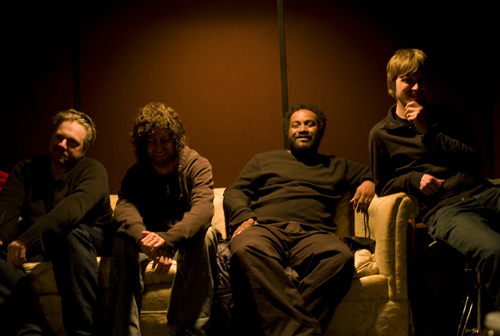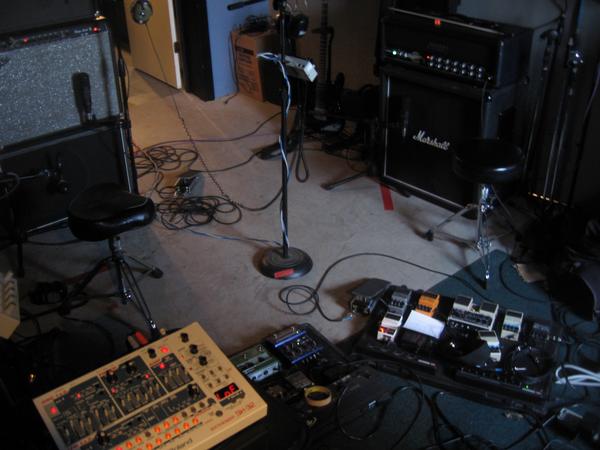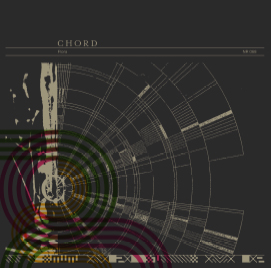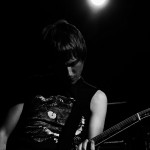
So we were minding our business the other day when who IM’s the s/t office but Trevor de Brauw. The Pelican guitarist had apparently seen our news story on their looming record deal with Southern Lord–a story he proceeded to clarify. While we can’t tell you who’s really guesting on Pelican’s next EP, we did manage to uncover a mound of details about Flora, the Neurot debut of Chord.
De Brauw has helped lead the Chicago-based “drone collective” for more than five years. Now before you start making condescending Sunn O))) comparisons, know that Chord whips up an “ambient wash of notes” on their first proper full-length. For an idea of what this actually means, check out the exclusive excerpt below (complete with our unedited IM interview), as well as a pack of “ringdrones” they recorded for your iPhone.
[audio:http://www.self-titledmag.com/wp-content/uploads/audio4/Am7_excerpt.mp3]
stmag1: so when did you start playing with these guys?
tbd: the band started out of conversations kyle [benjamin], jason [hoffman], phil [dole], and i had in 2003. played our first show in 2004
stmag1: conversations involving brian eno?
tdb: we’ve been getting together sporadically ever since
tdb: conversations revolving mainly around rhys chatham
tdb: well, really just revolving around drones and ways they interact
stmag1: what chatham piece or album opened you up to his stuff?
tdb: we wanted to see what this concept would sound like, but we felt like it would more interesting to try it out live than in a studio
tdb: i think the chatham stuff was more incidental, it was really about this concept of each person playing one note and then sound building the chord
stmag1: so all of your shows followed that formula–one note each building into a chord?
tdb: yeah, the concept is that each piece is one chord. we pick a chord and then separate it out to all the participants, one note per person. the musician can play the note however they want, any effect treatments are fine. the only rule is modulation effects of note bending or anything that will obviously affect pitch in a noticeable way
tdb: and the player is not limited by octave either, so you can jump around from octave to octave as long as you stay on note
tdb: the fact that none of the players droned their note meant that the performances ended up doing much more than expressing the chord
tdb: it became as much about the space between notes and the dynmaics of the performance
stmag1: was it frustrating playing like that at first? coming from something like pelican where you really rock the fuck out?
tdb: no, it was fun
tdb: it really let me tap into the ramones sensibility that brought me into music in the first place
tdb: only even simpler
tdb: the sound of the chord is seldom really even noticeable – it usually just sounds like ambience revolving around the notes that comprise it. occasionally you can hear the chord when we all hit our note at the same time. we call that moment “achieving the chord”
stmag1: that moment must be quite satisfying
tdb: achieving the chord is very satisfying as it’s something we set out to do from the start. i find it more interesting that it happens sparsely, though. i’m overall a lot happier that the project didn’t pan out as planned and that the ambience is more of what is realized. i think it is more interesting
stmag1: so aside from the shows, you have released some cd-r’s right?
tdb: there is a cd-r demo of sorts as well as a dvd-r of our brooklyn show. both are kept in print (for the time being) through a cd-r label we’re affiliated with called atomic mouse recordings
stmag1: so whos in the band now?
tdb: those same four. kyle benjamin. phil dole. jason hoffman. and myself
tdb: we used to do shows with upwards of ten people, but we found tem too muddled
tdb: dynamics and stmospherics are much easier to control in small scale performances
2:15 PM
stmag1: yeah i can only imagine

stmag1: so whats the deal with this neurot disc?
stmag1: is it stuff youve performed before then?
tdb: well, instead of doing a show in 2008 we decided to make a recording. up until then we had only met to play once outside of a live context, which is when we made the “studio” portion of or cd-r
tdb: other than that all recordings and performances were live
2:20 PM
tdb: we were meeting pretty much once a year so decided booking studio time would be easier than booking a show
stmag1: how much time did you spend recording then?
tdb: we went in for one afternoon to try out three shorter form ideas we had. our performances tend to be about 45 minutes, so we kind of whittled it down and came up with loose structures instead of free form improvisation to keep it on the brief side of things. well as brief as 15 minutes
stmag1: so the final disc has three long pieces?
tdb: the first session was 4 hours. the third song which was a really different concept for us didn’t work, so we went back a couple of months later to redo it and one more chord
tdb: the second session was probably 6 hours
2:25 PM
stmag1: how was it a different concept?
tdb: we tried a new method based on sudoku. we did music charts where the four notes of the chord were assign a numerical value. we played to a click track on each beat traded notes, so that all four notes of the chord were always played, but played by a different person each beat
2:30 PM
stmag1: sounds very complicated
stmag1: and if you didnt have the right guitarists with you, you’d be fucked
tdb: yeah, we’re all somewhat amateurish. hence it failed the first time
tdb: we kept playing wrong notes and everything it needed a redo
stmag1: but im sure there are ‘beautiful mistakes’ all the time

stmag1: did you have someone produce this or just an engineer that hit record?
tbd: greg norman was manning the record button. he did the tusk albums and the Fire In Our Throats recording
stmag1: oh rad
stmag1: heavy duty mixing afterwards?
tdb: the first session was done live
tdb: the second session was multitracked for future mixing
stmag1: that mean it sounds a lot different than the others?
tdb: not so much
tdb: same recording enviornment, same amps
tdb: same musicians, same mics
tdb: we just wanted to make sure the sudoku track worked right since it was such a depature and harder to get it to sound right
tdb: it didn’t end up sounding like one chord played over and over at all, it just sounds like a song
tdb: kind of weird
tdb: our ideas never work how we plan them, but i think they work out better, so i don’t mind
stmag1 :a 15 minute song?
tdb: they’re all 10-15 minues
tdb: so yeah
stmag1: cool man. so remind me of how this all relates to eno?
stmag1: less chatham, more “pussyfooting“?
tdb: the way it ended up sounding, although not the original aim, was as an ambient wash of notes
stmag1: you should have called it “pussyfooting around”
tdb: haha
tdb: no
stmag1: so we should all be stoned when consuming the new chord record?
tdb: the notes betray their origin in the final recording. i get confused who’s playing what
stmag1: thats cool though. less a band than one entity.
tdb: the chord record is appropriate for drug consumption, late night drives, relaxing after a long day of work, taking a nap, and close listening under the influence of massive of amounts of caffeine
2:40 PM
tdb: yeah, exactly. that’s how it relates to eno. the ambient records he did are almost faceless. i feel like we have a similar feel. those moments of identity that shine through, but for the most part the sound of the group is of one entitity
stmag1: so itll calm me down the next time my hearts palpitating from a pot of coffee?
tdb: possibly.
tdb: i’m not going on record to promise you anything
stmag1: fair enough

